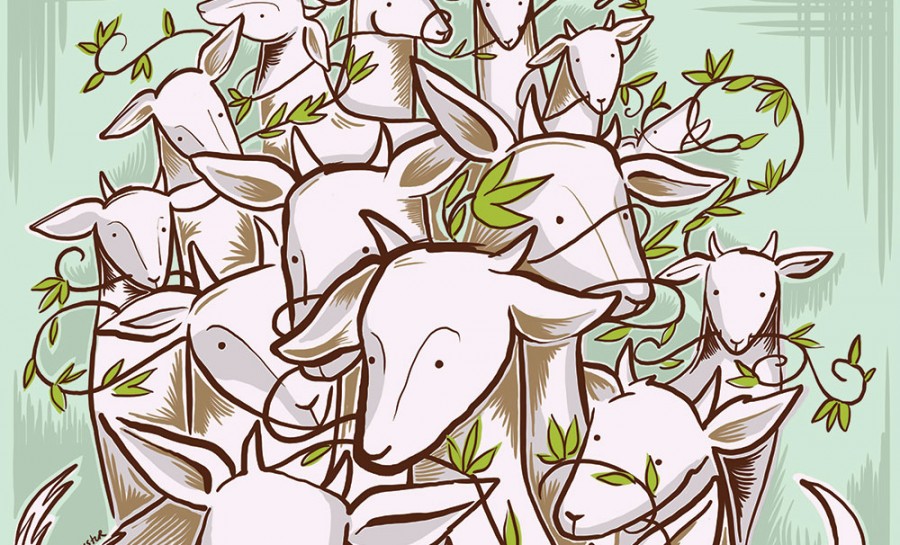Get Your Goats
Critters help Hudson Valley homeowners eliminate invasive plants.
By Eve Fox | Illustration by Emily Sylvester | Spring 2016 | Features
Exotic plants are invading New York State’s landscape, clogging woods and meadows with a new understory that’s not only inhospitable to native species but also provides the perfect conditions for Lyme disease-carrying ticks to thrive. Meanwhile, poison ivy, while native, is also increasing. So, no matter how thoroughly you check for ticks or scrub your skin after encountering poison ivy, simple outdoor activities like walking in the woods or mowing the lawn are becoming anxiety producing and even dangerous.
Recent studies by the University of Connecticut found that forests infested with Japanese barberry had 12 times more deer ticks per acre than unspoiled forests. Scientists attribute the trend to climate change: Rising carbon dioxide levels cause invasive plants to grow bigger and faster, and poison ivy to have higher levels of urushiol, the oil that causes an itchy allergic reaction.
Fortunately, poison ivy and many other invasive plants are among goats’ favorite foods. “Poison ivy and Japanese knotweed are probably tied for [goats’] first choice, followed by multiflora rose and anything else with thorns,” says Larry Cihanek, who’s operated and operated Green Goats, a goat-powered vegetation-removal service in Red Hook, for 10 years.
Goats are gaining popularity across the country as an eco-friendly, cost-effective way to clear land of unwanted plants. The critters are devouring kudzu down South; chowing down on the poison oak, thistle, and brambles that fuel forest fires out West; and gobbling up plants like poison ivy, Asiatic bittersweet, and buckthorn from parks and estates throughout the Northeast. Goats regularly consume Boston’s Hyde Park’s Asiatic bittersweet, buckthorn, and poison ivy; and, here in the Hudson Valley, visitors and staff members alike enjoy watching Cihanek’s goat herd dining out on Vanderbilt Mansion’s hard-to-access hilly slopes in Hyde Park and among Wilderstein Historic Site’s wooded areas in Rhinebeck.
Hudson Valley homeowners are also taking advantage of goats to rid their yards and woods of noxious weeds. Jennifer and Eric DeCamp recently hired a herd of goats from Red Hook-based Hudson Valley Kinders and Kritters to clear out an acre of wooded land that borders their Rhinebeck backyard. They chose goats to avoid having toxic chemicals around their young daughter or the sound of heavy machinery wreak havoc on her naps.
“There was a ton of poison ivy and thorn bushes. Our baby was just starting to walk, and we wanted to be able to have her back there without having to worry about what she might be getting into,” says Jennifer DeCamp.
After walking the DeCamps’ property to identify any shrubs, flowers, or trees that would need protecting, and to determine that there were no potential hazards for the goats, the owners of Hudson Valley Kinders and Kritters, Stephanie Wyant and Paul Williams, arrived with a trailer carrying 10 goats they call Green Machines, and an acre of portable, flexible, solar-powered electric fencing.
Wyant fenced in the goats out of reach of the shrubs the DeCamps wanted to preserve, and made sure there was access to shade and plenty of water to drink. The goats feasted on the poison ivy, barberry, and multiflora rose that were clogging the DeCamps’ forest understory. Wyant or Williams returned daily to check on the goats, refresh their water (goats are finicky when it comes to their drinking water), and move them to a new, uncleared area. By the end of a week, the goats were full, and the woods were gloriously empty.
“We’re really happy,” says DeCamp. “Everything we didn’t want is gone, and you can actually walk into the woods now. It looks like we have a lot more land because it’s so much more open.”
In Hopewell Junction, Carolyn Ohlson hired 15 Green Machines goats to remove poison ivy, grapevines, Japanese barberry, and multiflora rose on her lightly wooded property. Ohlson says she enjoyed watching the goats and was “extremely satisfied” with them. “I’m hoping that if the goats come back again, they’ll rid my land of Japanese barberry for good,” she says.
“Everyone we work with puts the environment first,” says Wyant. “We’re never gonna be cheaper than a guy with a weed whacker, but our goats can go places he can’t, and they don’t pollute—the only thing they leave behind is great fertilizer.”
In addition to these selling points, goats are undeniably entertaining. “It’s just fun to interact with them—they each have such distinct personalities,” says Wyant. One of the Green Machines is called Evel Knievil. “You can see right away that her main goal in life is to have fun,” she explains.
It’s a rare and beautiful thing when everyone is happy, but that’s the case when it comes to goats grazing professionally: Homeowners get cleared land and lower tick populations, native species gain an edge, and the goats eat their favorite foods. Even the managers of the goat brigades seem to enjoy themselves. “It’s a happy way to make a living, and a happy way to be a goat—they just walk around and eat all year,” says Green Goats’ Larry Cihanek.
Sources
Hudson Valley Kinders and Kritters & Green Machines
Facebook.com/HudsonValleyKinders
845) 514-0063
[email protected]
Green Goats
Green-Goats.com
(845) 876-4438
[email protected]
